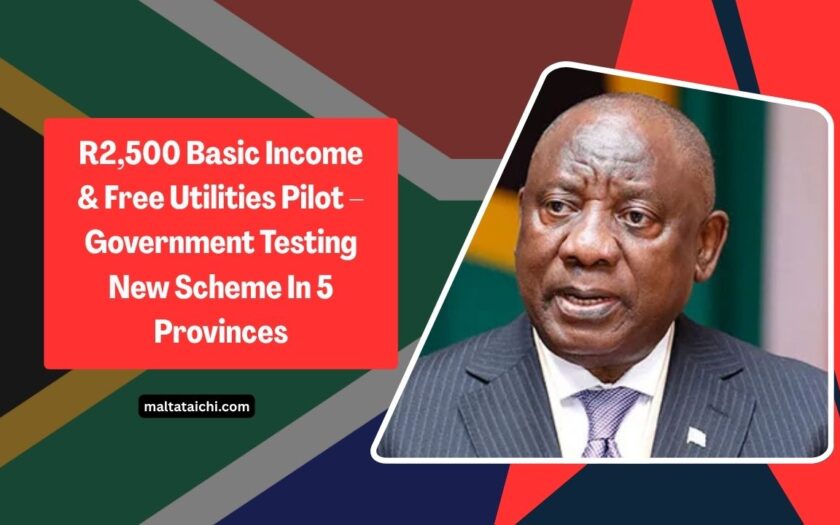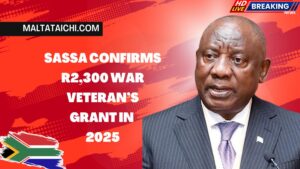The South African government has introduced a bold new initiative to address poverty and alleviate economic stress among low-income individuals.
Starting in July 2025, a pilot programme will roll out in five provinces offering a R2,500 Basic Income Grant along with free utilities such as electricity and water.
This groundbreaking scheme aims to reduce financial burdens on households while testing the feasibility of a Universal Basic Income (UBI) model for the country.
What is the R2,500 Basic Income Grant + Free Utilities Scheme?
The pilot programme combines direct financial assistance with utility support to help struggling households. The scheme includes the following:
- Monthly Cash Grant: R2,500 for each eligible recipient
- Utility Support: Free electricity and water units (subject to caps)
- Duration: 12-month trial run
- Target Group: Unemployed individuals, informal workers, and vulnerable groups
- Objective: Evaluate economic impact and administrative feasibility
This dual-benefit model seeks to address both immediate cash flow needs and the rising cost of living. The government is working in partnership with municipal services to provide free electricity, water, and refuse removal, in addition to financial aid.
Provinces Involved in the Pilot Scheme
The programme is being tested in a selection of provinces to ensure diverse geographic and economic representation. Here’s a breakdown of the regions and their coverage:
| Province | Urban Areas Covered | Rural Areas Covered | No. of Beneficiaries | Utility Providers Involved | Local Government Partners | Duration |
|---|---|---|---|---|---|---|
| Gauteng | Johannesburg, Tshwane | None | 80,000 | Eskom, Johannesburg Water | CoJ Metro | 12 months |
| KwaZulu-Natal | Durban | uMzimkhulu, Nongoma | 60,000 | eThekwini Water, Eskom | eThekwini Municipality | 12 months |
| Eastern Cape | Gqeberha, East London | Lusikisiki, Mount Frere | 50,000 | Nelson Mandela Bay Utilities | BCM Metro, OR Tambo DM | 12 months |
| Limpopo | Polokwane | Giyani, Musina | 40,000 | Lepelle Northern Water | Polokwane Municipality | 12 months |
| Northern Cape | Kimberley | Upington, Springbok | 30,000 | Sol Plaatje Utilities | Provincial Admin | 12 months |
Eligibility Criteria for the Basic Income Grant
To qualify for the R2,500 Basic Income Grant, applicants must meet the following requirements:
- Age: 18 years or older
- Residency: Must be a South African citizen or permanent resident
- Income: Must earn below R1,000 per month
- Unemployment: Must not currently be receiving other SASSA grants, except for Child Support Grant
- Location: Must reside in one of the selected pilot areas
- Verification: Must provide proof of residence and utility account
What Beneficiaries Will Receive
The R2,500 Basic Income Grant aims to reduce poverty and support vulnerable households. Here’s a breakdown of the benefits:
| Benefit Type | Monthly Amount/Value | Notes |
|---|---|---|
| Basic Income Grant | R2,500 | Sent via bank or mobile wallet on the 5th of each month |
| Free Electricity Units | 100 kWh | Distributed via Free Basic Electricity (FBE) system |
| Free Water Allocation | 6 kilolitres | Monthly cap via municipal billing |
| Free Refuse Removal | Municipal Rates | Waived for qualifying households |
| Debt Write-Off | Up to R5,000 | Municipal arrears for indigent households may be cancelled |
| Job Readiness Program | Non-cash | Free skills workshops included in select pilot zones |
| Food Parcel Support | R500 voucher/month | In areas with high food insecurity (added benefit) |
Participants will receive these benefits directly through prepaid meters or mobile credit codes depending on the region. Urban areas will have smart meters, while rural areas will receive physical vouchers.
Government’s Goal and Evaluation Plan
The government aims to assess whether this combined model can reduce poverty and stabilize household finances. The programme’s impact will be monitored through the following methods:
- Monthly audits: To ensure transparency and prevent fraud
- Beneficiary surveys: To track real-world economic impact
- Statistical analysis: To evaluate how the programme influences local economies
The findings from these evaluations will help determine whether the programme can be scaled nationally.
Funding and Expansion Plans
The R2,500 Basic Income Grant is funded through a combination of National Treasury contributions (R3.8 billion pilot budget), municipal credits, and international donor support (UNDP, EU).
If successful, the programme could expand nationally by 2026, replacing or complementing existing welfare systems like the SRD Grant.
The R2,500 Basic Income Grant with free utilities represents a bold step towards addressing poverty and improving living standards.
As the government tests this model in five provinces, the success of this pilot could shape the future of South Africa’s welfare system, potentially transforming the way the country supports its most vulnerable citizens.
FAQs
Who qualifies for the R2,500 Basic Income Grant?
To qualify, individuals must be 18 years or older, unemployed, earning below R1,000/month, and reside in the selected provinces.
How will the utilities be provided?
Participants will have prepaid meters credited automatically with free units of electricity and water each month, or receive mobile codes in rural areas.
Can I apply for this programme if I don’t meet all the criteria?
The scheme is mainly auto-enrolled, but individuals can appeal by visiting their local municipal office or SASSA branch and submitting the required documentation.




